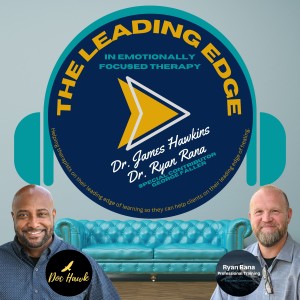
Welcome to the Leading Edge in Emotionally Focused Therapy, hosted by Drs. James Hawkins, Ph.D., LPC, and Ryan Rana, Ph.D., LMFT, LPC—Renowned ICEEFT Therapists, Supervisors, and Trainers. We're thrilled to have you with us. We believe this podcast, a valuable resource, will empower you to push the boundaries in your work, helping individuals and couples connect more deeply with themselves and each other.
James and Ryan discussed the importance of recognizing and working with clients' dysregulation, emphasizing the need for therapists to move towards dysregulation and validate clients' emotional experiences. They also discussed practical strategies for addressing dysregulation and the significance of emotional dysregulation in therapeutic processes.
Introduction to Recognizing Dysregulation
- Introduces the topic of recognizing and working with dysregulation in resistant clients.
- And discuss the importance of capturing the moment of dysregulation and working with compassion and empathy.
- Shares a personal anecdote about experiencing dysregulation during a flight, highlighting the importance of recognizing and addressing emotional dysregulation.
Understanding Emotional Dysregulation
- Explains emotional dysregulation, emphasizing that it is a common issue in resistant clients.
- The importance of moving towards the dysregulation to address the underlying fear and pain.
- A metaphor about flying to illustrate the experience of emotional dysregulation and the need for validation and support.
- The importance of training to recognize and respond effectively to emotional dysregulation in clients.
Practical Strategies for Working with Dysregulation
- Practical strategies for working with dysregulation, including capturing the moment and addressing the underlying fear and pain.
- A story about a client who experienced dysregulation during a session and how the therapist helped the client recognize and befriend their dysregulation.
- Emphasize the importance of meeting clients where they are and addressing their emotional needs.
- The importance of pushing clients to address their dysregulation in a controlled and supportive manner.
The Role of Emotional Dysregulation in Therapy
- Emotional dysregulation is a natural part of the therapeutic process and should be addressed with compassion and understanding.
- It is important to recognize and address emotional dysregulation in clients to facilitate therapeutic change.
- A story about a client who experienced dysregulation during a session and how the therapist helped the client recognize and address their emotional needs.
- The importance of training and practice in addressing emotional dysregulation effectively.
The Importance of Self-Care for Therapists
- The importance of self-care for therapists who work with emotionally dysregulated clients.
- The need for therapists to increase their capacity to be dysregulated and to practice self-care to maintain their well-being.
- Tips for self-care include taking breaks, practicing mindfulness, and seeking colleague support.
Series Overview
We are excited to announce the beginning of a new series focused on practical help when a client’s nervous system becomes entrenched and cannot open to their experience, their partner’s experience, or the clinical process. We want to help you with a clear frame of nuance and intentionality in this clinical experience.
General Outline of How We Plan to Cover This Presentation
- Notice it and Asses It Accurately: Establishing Focus
- Get in Front of it and Contain it
- Realize it is Dysregulation: Track, Reflect, and Validate
- Spend A Whole Session of Curiosity About the Experience
- Show Impact and Cost- V:OUS
- Cost to Self, Cost to Partner(s), Cost to the Relationship
- Here & Now: Bring it Forward
- Make it Experiential: Get it Replaced.
To support our mission and help us continue producing impactful content, your financial contributions via Venmo (@leftpodcast) are greatly appreciated. They play a significant role in keeping this valuable resource available and are a testament to your commitment to our cause.
We aim to equip therapists with practical tools and encouragement for addressing relational distress. We're also excited to be part of the team behind Success in Vulnerability (SV)—your premier online education platform. SV offers innovative instruction to enhance your therapeutic effectiveness through exclusive modules and in-depth clinical examples.
Stay connected with us:
- Facebook: Follow our page @pushtheleadingedge
- Ryan: Follow @ryanranaprofessionaltraining on Facebook and visit his website
- James: Follow @dochawklpc on Facebook and Instagram, or visit his website at dochawklpc.com
- George Faller: Visit georgefaller.com
If you like the concepts discussed on this podcast you can explore our online training program, Success in Vulnerability (SV).
Thank you for being part of our community. Let's push the leading edge together!
No comments yet. Be the first to say something!